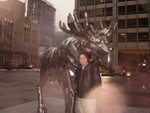One name:
Christ
We must not project our own needs on to the young. I am demographically part of the "youth" of America. Looking at the United States through the lenses of history the the time before 1968, the great cultural "tipping point," I could see how there was a real hunger for freedom and liberation. The outlet to allow for expression.
This is forty years later, and the time that separates the moment of the moment from then grows with (well) each moment. The needs of the young, of whom I am one, are different. We do not hunger for freedom. This is something we should be grateful to our parents for.
We have our ways of expressing ourselves. If anything we are "hyper-expressed." We have tried everything. We have found everything wanting. We look to the past, and it is something more than nostalgia. We have grown up, and in the process we have been told that mean and purpose and significance have been de-constructed. We do not seek to return to a period of person repression, enforced by unjust laws and outdated cultural mores, but rather we seek to return to the world that has meaning, purpose and significance. We ask the question:
If the world has no meaning, purpose or significance; does it not necessarily follow that I do not have any meaning, purpose or significance?In some of this hunger has taken explicit form, and we start on our pilgrimage toward the horizon of meaning. All of us, if even only in implicit and unexamined form, share in this hunger. We know in the depth of our very beings, we are not mistakes of chemistry and biology, but that we do have purpose (to use the Greek word: telos, we seek an ultimate end).
In a world that has (thus far) told us that an autonomous will to power, ultimate freedom and a shallows stagnant form of false-tolerance are the ultimate values, we have experienced a type of existential vertigo. We search for the stability, for the lines, from which to stabilize ourselves in a dizzy culture. Our need for stability is not neurotic, but legitimate.
So from this general milieu I emerge. I ask:
Where should I go?No direction was offered. Upon discovering Christ, or more accurately, upon knowing that he had discovered me, I ask:
Where should I go Lord? You have the words of eternal life.The current Pope and the previous Pope have both drawn us in over and over with this simple phrase: Come to know the face of Christ, and he will change everything.
This is true. So I say to you: Come to know the face of Christ, and he will change everything.



1 comment:
There was a good comment on this same entry, what I had also posted on Facebook (c):
"You answered the question of why you want to be a Christian, but not the question of why you want to be a priest." (from Father Ben Sember: http://holypriesthood.blogspot.com/)
Here is the start of a response:
"It is odd -- but could it be I know -- and I know that it is a mystery -- so in many ways while I am certain I still grasp for the words of the ineffable (for those who understand what ineffable means [sorry cheap dig against ICEL])?
"If Dulles has his "Theology as Symbol," his "Models of Revelation" and his "Models of Church," where is "Models of Priesthood"?
"JPII reflects in "Gift and Mystery" about when was prostrated during his ordination, how his whole body became a symbol for his whole being at that moment -- to allow others to walk over him (meant in the best possible way) so that he becomes a bridge for them in to the greatest mystery, which is the Truth that we know the most certain, but the least about.
"Does that sound like the start of a good answer?
"Perhaps the question needs to be changed at this point: NOT: Why do I want to become a priest, but THIS: Why has Christ called me to be one?"
Post a Comment